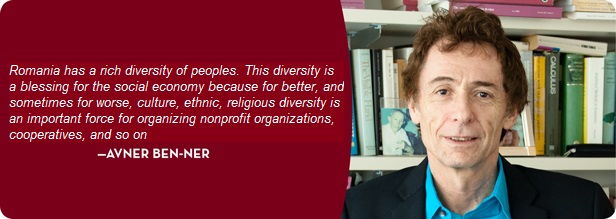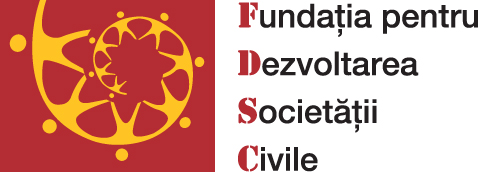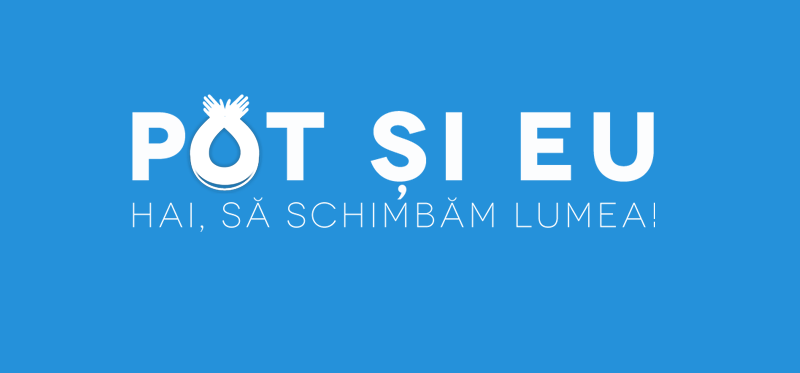Data: 2013-12-18
(aici versiunea in limba romana)
Romania has always been at the crossroads of different cultures. They all left their imprint on the country and its population. Despite attempts to homogenize the population or to pretend that it is homogenous, Romania has a rich diversity of peoples. And the different groups are far from being themselves homogenous, due to how far foreign powers reached, how long they stayed, and of course thanks to the mountains and valleys that created many micro-cultures. This diversity is a blessing for the social economy.
Avner Ben-Ner is Professor in the Center for Human Resources and Labor Studies in the Carlson School of Management and Affiliated Professor in the Law School at the University of Minnesota.
As a scholar he is mostly known for his research on the reasons for coexistence of different types of organization in the mixed economy. He analyzed theoretically the reasons why producer cooperatives, employee buy-outs and nonprofit organizations exist alongside private for-profit firms and public organizations.
His research findindgs show that various organizations in the social economy represent collective responses to diverse problems of asymmetric information between workers and management and between consumers and sellers.
He studied extensively in a comparative perspective the structure and performance of nonprofit organizations, producer cooperatives, government organizations and for-profit firms, to which he made significant theoretical and empirical contributions.
In his theoretical and empirical work, he has shown the importance of balancing various components of organization design, particularly the allocation of decision-making, types and strength of incentives and monitoring, and adjusting them to firm circumstances, particularly technology and strategy.
His most known books are:
• The Study of the Nonprofit Enterprise: Theories and Approaches (Helmut Anheier and Avner Ben-Ner, eds.), New York, 2003
• Economics, Values, and Organization (Avner Ben-Ner and Louis Putterman, eds.; Preface by Amartya Sen), Cambridge University Press, 1998
• The Nonprofit Sector in the Mixed Economy (Avner Ben-Ner and Benedetto Gui, eds.), Ann Arbor: University of Michigan Press, 1993
Ancuta Vamesu: I have met prof Ben Ner at the CIRIEC Conference in Antwerp where he gave a most interesting presentation on THE GLOBAL SUPPLY CHAIN: ROLES FOR THE SOCIAL ECONOMY
Dear Profesor Ben Ner,
It has been a pleasure to meet you at the CIRIEC Conference in Antwerp. I would like to make your work and your views in this field known to the Romanian public. Therefore I would be grateful if you would accept to answer 2 questions for an interview that will be published on the site of the Institute of Social Economy - a news and information site for researchers, practitioners and decision-makers.
1. What do you think is the role of social economy and social entreprises in the world today? Are they new inventions or innovations or instruments of the past that survive or reappear in different shapes and forms?
B.N.: "We live in an interesting era, with numerous challenges and fantastic opportunities. Rapidly evolving technologies can turn fantasies into reality in any realm we can think of, and in areas we can’t imagine today but we may find out tomorrow, in a month and certainly in a decade. The opening up of the world to the less inhibited movement of people, ideas, goods and services has vastly increased the productive and creative potential of the entire world. So we – humanity – have the opportunity to prosper and flourish much more than ever before.
But exactly the same forces have unleashed also destructive possibilities and competition between countries and groups that can create extreme havoc locally and globally. The technology that makes life easier and richer can be used to oppress and impoverish lives. The movement of people that makes it easier to match talent with the need for it, to break out from the narrow confines of one’s birth circumstances, that movement of people also increases conflict and hatred. And so on and so forth.
Private sector actors drive both trends, seeking profit where they can find it. Governments accentuate both trends, as they cater to diverse and conflicting interests, but rarely behave as consistent pro,oters of the public good, either locally or globally.
Hence a role of social economy organizations.
The organizations that comprise the social economy are diverse in terms of their goals and behavior.
But what is unique to the social economy and differentiates them from both the for-profit and government sectors is that they are voluntarily constituted to seek goals common to a small or large group of people, and they seek to pursue these objectives either without making profits for an individual or a small group of stakeholders, or they seek profits and other financial benefits for the entire group or a class of stakeholders.
This is common to nonprofit organizations, producer cooperatives, social enterprises and consumer cooperatives.
So what role can these play to enhance the opportunities and reduce the threats, locally and globally? They can – if they are properly organized and governed – offer local services that are more directly tailored to the preferences of local people, and offer regulation-like services that fill in the gap left by government and private organizations in the assurance of working conditions, environmental protection, quality of food, and such."
2. For the particular case of Romania, a country to which you have some personal connection, do you think there are particular cultural, historical, economical conditions that impact on how these kind of entreprises - organisations evolve and how? How do you see this sector evolving?
B.N.: Romania has always been at the crossroads of different cultures. They all left their imprint on the country and its population. Despite attempts to homogenize the population or to pretend that it is homogenous, Romania has a rich diversity of peoples. And the different groups are far from being themselves homogenous, due to how far foreign powers reached, how long they stayed, and of course thanks to the mountains and valleys that created many micro-cultures.
This diversity is a blessing for the social economy because for better, and sometimes for worse, culture, ethnic, religious diversity is an important force for organizing nonprofit organizations, cooperatives, and so on. Romania, more than many other countries, has a strong local and regional character, which is essential for the successful formation and operation of many social economy entities.
Localism and regionalism have been the bedrock for successful collaboration in Emilia Romagna, the Basque country, parts of the US Pacific Northwest and other places, where organizations and associations that promote collaboration among individuals and companies have generated a lot of beneficial economic activity, enhanced social cohesion and encouraged diverse cultural activities. This does not take a lot of complex infrastructure, but it odes require some social entrepreneurship on the part of interested stakeholders or others who can act on their behalf.
Perhaps a historically-induced expectation that such activities are responsibility of the state or other governments may be an obstacle to such social entrepreneurship, but recognizing its persistence may be the first step towards overcoming it. I have written on this topic in a paper that emphasized nonprofit organizations, but it is relevant to other social economy organizations.
Many terms and concepts have been tainted due to their use by past regimes. I imagine that the term "cooperative" is one of those words that connotes involuntary activity that has nothing to do with cooperation, just as compulsory participation in picking corn or potatoes cannot be called volunteering except by extreme cynics, and the ensuing assistance to farmers reflected little if any solidarity. The corruption of words may require the introduction of different words to overcome the distaste for corrupted words, and to express contemporary sentiments and needs.
For a complete list of prof. Ben Ner articles visit this page.

(Photo sources: here and here)
















